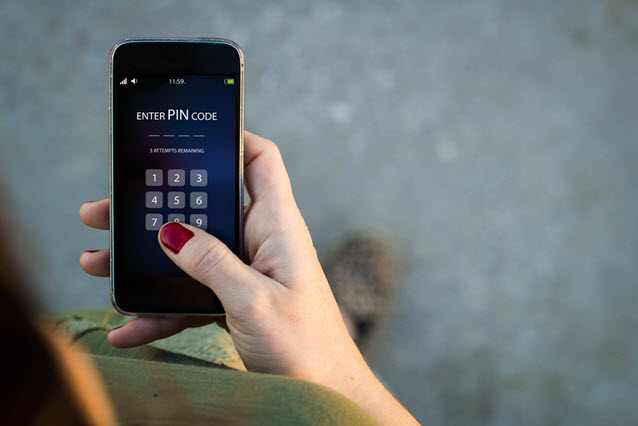6 Tips to Help Keep Your Smartphone Safe and Secure
You probably use your cell phone for just about everything. From paying bills, to storing private information and even managing your schedule, your phone is a major part of your day-to-day life. That’s why keeping your cell phone safe and out of the wrong hands is more important than ever. But you’re only human, so there’s always the risk of leaving your phone behind somewhere. You can’t always control these mistakes, but luckily you can take certain steps to keep your phone safe if and when these mistakes do occur.
1. Use a Strong Password
If you don’t password-protect your cell phone, you could be putting yourself at risk. A password is how you keep intruders out of your phone and your information safe. Of course, it isn’t enough to lock your phone, you need a strong password to reduce the likelihood of someone cracking your code.
Sure, a simple passcode will be easier to remember. But the easier your code, the easier it’ll be for someone to gain access to your information. So rather than use the last four digits of your phone number or a relative’s name, choose codes that aren’t obvious. As a precaution, change up your passcode every few months.
2. Lock Your Apps
Not only should you create a strong passcode for your phone, you should also create a passcode for apps that hold sensitive information. This is especially useful if you have banking or financial apps, which carry account numbers, routing numbers and more.
There are several ways to protect this information. You can enable finger or thumb print identification for logon purposes. If this isn’t an option, download an app that allows you to set up a separate password for apps on your phone. This provides an extra layer of protection and ensures the safety of your information.
3. Log Out of Apps
It’s also important to log out of apps when you’re finished. If your phone ends up in the wrong hands and you’ve forgotten to log out of an app—particularly social media apps—someone could pose as you and post embarrassing comments or, worse, collect personal, private information from your friends and family.
Some financial and banking apps have a time-out feature which automatically signs users out after a period of inactivity. Never utilize the save password feature when using these apps. This feature lets you sign into accounts without having to re-type your username and password each time. This can be fast and convenient, but if your phone is lost or stolen, it also gives a thief easy access to your information.
4. Get Antivirus Software
Antivirus protection isn’t just for your computer, it can also protect your smartphone. There isn’t antivirus software available for iOS phones, due to the unlikelihood of Apple apps containing viruses (these apps are vetted by the company before appearing on the app store). There is, however, the risk of a virus with Android phones. Protect your device from malicious software by downloading antivirus software, which reduces the likelihood of your phone being hacked and someone getting hold of your sensitive information.
5. Don’t Use Third-Party Apps
As tempting as it might be, avoid purchasing third-party apps. For safety reasons, only purchase through your phone’s app store. These apps are more likely to be safe, unlike third-party apps which may contain viruses.
6. Limit Use of Public Networks
Truthfully, you might not be able to avoid public networks altogether. Still, you should limit use of these networks. Connecting to a public network gives shady people an opportunity to hack your phone without you realizing it. So if you use a public network, do so quickly. Sign on, handle your business and promptly sign off to keep your phone safe.
Your phone is a mini computer, which means its safety can be compromised. There are, however, plenty of ways to protect your phone and your information, which significantly reduce the odds of someone stealing your information. So be prepared – your phone will thank you!
